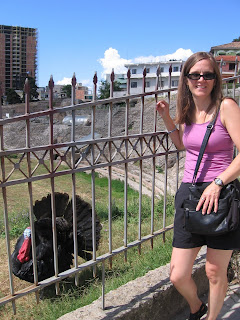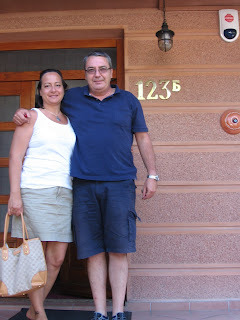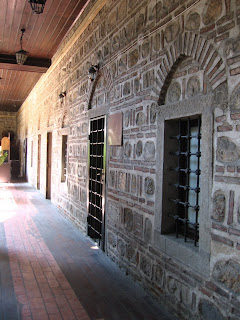Work continues to be busy – lots to do in my office, and I’m having the chance to work on a couple of side projects. The main one is on the question of remittances – the money that Albanian emigrants (primarily to Greece and Italy) have been sending back to Albania to help support family. This inflow of money is sizeable – since 1991, when thousands of Albanians left the country, remittances have grown to comprise up to 12% of Albania’s GDP. Now, since the global financial crisis and particularly the economic woes of Greece and Italy, remittances have slowed significantly. This has had an impact on nearly 60% of Albanian households and their consumption. In any case – this is what I am researching, along with another intern, in order to prepare a report on the subject. On Friday, I had a meeting with a director of Albania’s Central Bank, who heads up the country’s monetary policy. We spent an hour discussing the remittances issue and other economic challenges the government faces, and he very graciously answered a slew of questions in addition to adding much commentary of his own. On Monday (tomorrow, if I get these posts online today, Sunday the 31st, as I hope to!), I will meet with the main International Monetary Fund representative in Albania to discuss the same issue. In addition to work, I found out (after “only” five weeks at the Embassy) that interns can receive two hours per week of language lessons from the Embassy’s Albanian teacher. Unbelievable – I would have benefited from having language instruction from the very beginning!! Still, better late than never – I squeezed in two lessons with Roza, a fantastic teacher, later in the week and it’s made a huge difference. So much better to learn from a teacher than from reading a book… my vocabulary and grammar have really expanded a lot from those two lessons and we’ve covered a lot. Oh, and one more work-related thing: my co-worker, Juste (the husband of the woman I went to Greece with) took me to lunch at a popular restaurant that I’d heard a lot about – called “Mr. Chicken,” it serves chicken gyros and other roasted chicken fast food. Very yummy!
This weekend (hooray, I’m getting caught up!!) has been another Tirana-area weekend). Two more left before I leave Albania – my plan is to travel during both of them! But more on that later. On Friday, a short-term staffer at the Embassy (she’s only here for two weeks) called me and asked if I wanted to do some sightseeing with her, which I gladly accepted. Abby gave me her cell phone number and we decided what we would do on Saturday. This led to a funny (albeit disconcerting at the time) occurrence later that evening… On Friday evening, Jorid (my Norwegian friend) and I strolled down to the Bllok district of Tirana. This is the part of town where all of the communist party leaders, including Hoxha, once lived. It has now been transformed into Tirana’s trendy & fashionable hangout with restaurants, bars, night clubs, etc. Not that we were going to enjoy Tirana’s night scene per se J, but we did visit a French patisserie and enjoyed a great ambience over flaky pastry and tea.  |
| Jorid and Christina at the French cafe |
So afterward, I called Abby to finalize plans for Saturday. But an Albanian guy answered the phone. When he figured out I was not Albanian, he switched into pretty decent English and said he knew Abby (but the way he said it, it didn’t quite sound like Abby) and that she’d be right back – he asked for my name and said she’d call me back. OK… I was thinking, “How has Abby gotten to know an Albanian guy so soon after arriving??” At this point, I texted Abby’s Embassy point of contact to confirm the phone number she’d given me. My phone rang a few minutes later; it was Abby’s “friend,” Denis, again. He explained that she had gone off somewhere urgently but that I could meet up with him and his friends at the Millennium Center where they were hanging out. Ri-i-i-ght… Thankfully I finally got hold of the real Abby and we made our plans, but Denis called again, confessed there had been a misunderstanding and he knew someone with a similar name; he expressed his hopes that I understood and invited me again to meet him and his friends, which I politely but firmly declined. Quite late that same night, I heard from Denis one last time, via text message, reassuring me that he was not trying to mess with me earlier, and that he and his buddies would like to be friends – in which case I was to reply via text – but if not, he wrote, “have a beautiful life!” Needless to say, I opted for the “beautiful life.”
Saturday – yesterday – Abby and I went to the train station, where we jumped on a furgon (mini bus) to Durrës, Albania’s main sea port and very ancient city – the beginning of the Via Egnatia, which extends from Albania through Greece (I walked along it in Thessaloniki) and Turkey all the way to Constantinople. So Durres was the beginning of a heavily traveled thoroughfare for commerce, military, and personal travel. It is thought that the Apostle Paul almost certainly visited Durres and perhaps even was at the Roman amphitheatre there – and it has been speculated that another apostle, Titus, was martyred there at the amphitheatre. Impossible to be certain about this, but apparently there is some historical record that makes this conclusion plausible. Durres is now a major beach destination for Tiranans, as it’s only about 15 kilometers or so away (maybe a bit farther), and it remains very active as a commercial sea port. But we wanted to see the downtown area, explore the amphitheatre, go to the archaeological museum, and see the Adriatic Sea. We got to do all that – our first stop was the amphitheatre, which we got to explore for only 300 lëk ($3.00) apiece. One thing I have found is that in Albania, archaeological treasures – whether open-air ruins and castles, etc., or in museums – are entirely unprotected. Virtually no effort is made to keep people from clambering on them, grabbing a chunk of this or that, or touching millennia-old artifacts, mosaics, and statues in museums. In a way, this is refreshing – if we were in the U.S., this stuff would be only viewable at a distance, or behind bullet-proof glass. The amphitheatre was truly fascinating – seating 20,000 (the Durres population was about 25,000 at the time, from what I’ve read), it was a very major venue as Durres was an important Greek, and later Roman, outpost. Abby and I were able to explore the tunnels and lower levels of the amphitheatre under the seating area, see the stables where the animals were kept, and also go down a long tunnel that was the chariot entrance (for the wealthy who were coming to the amphitheatre), and see the ramps that the lions came down as they entered the arena area to make sport of the poor people who had been condemned to death – or as the gladiators made sport of them (the lions)…
 |
| A turkey greeted us at the amphitheatre... |
A short walk from the amphitheatre brought us to the museum. Approaching it, we saw amongst tall weeds and rubble, the museum’s “front yard” littered with broken pillars, capitals, and Communist-era bronze statues. It was very eerie and desolate – a cemetery of multiple bygone eras. Upon entering the museum, the woman behind the information desk greeted us in English. I jokingly asked, “How did you know we’re not Albanian?” J She laughed. I in my shorts, and Abby in her sneakers, plus our natural blonde hair – wherever I go I stand out, and people assume that I am American. As I have mentioned, people generally love the US, so sometimes I get stopped on the street by people who are curious and welcoming. But back to the museum – it was small, but worthwhile – more amazing artifacts from several centuries BC to early AD. Many artifacts touchable (I didn’t), and all of the artifacts in nearly perfect condition. Huge clay urns three feet in diameter; smaller vases, intricately engraved and painted with geometric patterns and images of ancient people going about their daily business. Absolutely amazing. We really wanted to take some pictures, and actually did dare to snap one or two without flash, before the reception lady told us it was not allowed. L Not surprising – but we hadn’t seen the “no cameras” sign earlier, so we hadn’t knowingly broken the rules… sometimes it’s easier to ask for forgiveness than for permission…!! Upon leaving the museum, we walked around to the back, where we found more discarded ancient trash and ventured out on the rubble-strewn yard area, examining the refuse and taking some close-up pictures of the Communist era “Workers of the world, unite!” man who was sprawled out on the ground, clenched fist still raised high 20 years after the collapse of his utopia.
 |
| Can I fit one of these in my suitcase?? |
Although we didn’t make it to the main sunbathing part of the beach, we did enjoy a nice walk along the waterfront and had lunch in a café on the boardwalk. This area was pretty much deserted – it looked like an abandoned amusement park: 1980s-style European techno music was blaring to no one, and we wandered around the few battered looking rides. (We did hear that the area perks up in the evening, when it's cooler)
 |
| The menu said "salad with mice" - e.g., corn (maize) :-) |
 |
| Adriatic fisherman |
 |
| Driver, Abby and Christina headed back to Tirana |
Grabbing a furgon back to Tirana, we decided to check out the history museum (for a second time for me; I’d been there last weekend, but had been quite rushed in going through the three floors of exhibits so I was glad to see it again) and later, walking by the art museum, we checked to see what its hours of operation were since Abby wanted to see it before she leaves next week. It was already closed, but as we were standing there, a guard popped his head out the entrance door, motioned us in, and indicated that we were welcome to enjoy the museum – for the usual fee of 200 lek. He didn’t give us tickets, though. We concluded that he had been tasked with closing up the museum that evening and that by letting us in (along with a few others), he was earning some extra pocket money… We had heard that some old Communist-era statues had been warehoused behind the gallery, so after our visit, we walked around the building to the back, where we indeed found a distinguished, if tarnished, Stalin, and Lenin, whose arms had been broken off – in addition to another proletariat worker and a woman with an AK-47. The day ended with another walk to the Bllok – the swanky district – and a nice meal of salad and pilaf followed by akullore (ice cream).
 |
| They've seen happier times... |
Today – Sunday – has been more relaxing; laundry, church with Lola followed by lunch at her house, catching up on e-mail (at the Spieckers’ since I don’t have internet at my place), etc. Looking forward to another busy work week, a few more exploring excursions with Abby after work (up the mountain overlooking Tirana on the cable car), and next weekend – planning a trip to the city of Saranda, in the south of Albania, where the Adriatic and Ionian seas meet and right where the Greek island of Corfu lies. I hope it works out! It will be seven hours on a furgon…
***Note: tomorrow is the beginning of Ramadan, the Islamic holy month. All of the mosques have hung large banners reminding people of this fact. In this country whose population is 70% Muslim (albeit nominally), I will be interested to see if there are clear manifestations of the observance of this period.
 |
| Tirana's mosque advertising Ramadan |













































